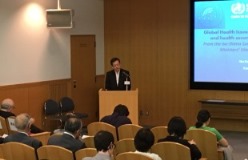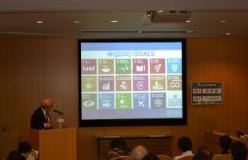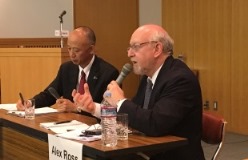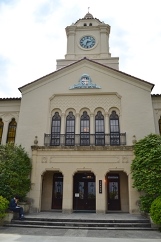WKC Forum report "Global Health Issues: Improving health and health security for the world From Ise Shima Summit to the G7 Health Ministers’ Meeting in Kobe"

The WHO Kobe Centre, along with Kwansei Gakuin University (KGU) and the G7 Kobe Health Ministers’ Meeting Promotion Council organized an open public Forum “Global Health Issues: Improving health and health security for the world” on 8 June 2016 at KGU.

The objective of this public forum was to raise awareness of global health, including Japan’s leadership role, issues that will be considered at the G7 Health Ministers' Meeting (100 days from now), to give university students in the Kansai region an opportunity to learn and to think about global health, the work and role of the WHO Kobe Centre, and possible careers in international health. About 100 people attended the Forum.
Dr Mitsuaki Yamamoto, Chief Medical Officer of Hyogo Prefecture mentioned in the opening that, based on the G7 Ise Shima Vision for Global Health, the G7 Kobe Health Ministers’ Meeting in Kobe in September 2016 is expected to further discuss global health priority issues that students and citizens should closely follow.

He emphasized the importance of health system strengthening to achieve universal health coverage (UHC), emphasizing equity (“leaving no one behind”). In particular, Mr Ross introduced the new WHO Comprehensive Health Emergency Programme which reinforces WHO’s actions to support countries implement the International Health Regulations, the Sendai Framework for Disaster Risk Reduction, and to coordinate with all stakeholders. The Government of Japan was congratulated for its $50 million contribution to WHO’s programme. Mr Ross stressed the need for countries to ensure basic functioning health systems to prevent and detect new outbreaks, and that the information and biotechnology revolutions offer many new opportunities.
Mr Ross discussed the WHO Kobe Centre’s research priorities focusing on UHC, Innovation, and Ageing and how the Centre’s work is contributing to the planning for a rapidly ageing world, to achieve UHC, and to translate lessons and innovations from and to Japan. Japanese and international academias are important partners of WKC.
discussed the WHO Kobe Centre’s research priorities focusing on UHC, Innovation, and Ageing and how the Centre’s work is contributing to the planning for a rapidly ageing world, to achieve UHC, and to translate lessons and innovations from and to Japan. Japanese and international academias are important partners of WKC.


